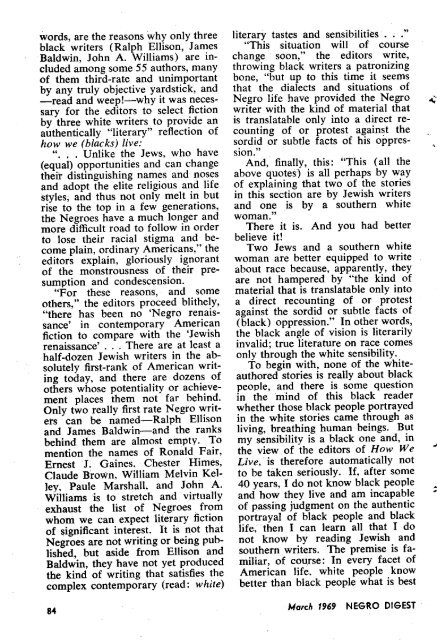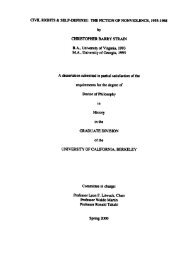Negro Digest - Freedom Archives
Negro Digest - Freedom Archives
Negro Digest - Freedom Archives
Create successful ePaper yourself
Turn your PDF publications into a flip-book with our unique Google optimized e-Paper software.
words, are the reasons why only three<br />
black writers (Ralph Ellison, James<br />
Baldwin, John A . Williams) are included<br />
among some 55 authors, many<br />
of them third-rate and unimportant<br />
by any truly objective yardstick, and<br />
-read and weep!-why it was necessary<br />
for the editors to select fiction<br />
by three white writers to provide an<br />
authentically "literary" reflection of<br />
how we (blacks) live :<br />
" . . Unlike the Jews, who have<br />
(equal) opportunities and can change<br />
their distinguishing names and noses<br />
and adopt the elite religious and life<br />
styles; and thus not only melt in but<br />
rise to the top in a few generations,<br />
the <strong>Negro</strong>es have a much longer and<br />
more difficult road to follow in order<br />
to lose their racial stigma and become<br />
plain, ordinary Americans," the<br />
editors explain, gloriously ignorant<br />
of the monstrousness of their presumption<br />
and condescension .<br />
"For these reasons, and some<br />
others," the editors proceed blithely,<br />
"there has been no `<strong>Negro</strong> renaissance'<br />
in contemporary American<br />
fiction to compare with the `Jewish<br />
renaissance' . . . There are at least a<br />
half-dozen Jewish writers in the absolutely<br />
first-rank of American writing<br />
today, and there are dozens of<br />
others whose potentiality or achievement<br />
places them not far behind .<br />
Only two really first rate <strong>Negro</strong> writers<br />
' can be named-Ralph Ellison<br />
and James Baldwin-and the ranks<br />
behind them are almost empty . To<br />
mention the names of Ronald Fair,<br />
Ernest J : Games : Chester Himes,<br />
Claude Brown, William Melvin Kelley,<br />
Paule Marshall, and John A.<br />
Williams is to stretch and virtually<br />
exhaust the list of <strong>Negro</strong>es from<br />
whom we can expect literary fiction<br />
of significant interest. It is not that<br />
<strong>Negro</strong>es are not writing or being published,<br />
but aside from Ellison and<br />
Baldwin, they have not yet produced<br />
the kind of writing that satisfies the<br />
complex contemporary (read : white)<br />
84<br />
literary tastes and sensibilities . : .<br />
"This situation will of course<br />
change soon," the editors write,<br />
throwing black writers a patronizing<br />
bone, "but up to this time it seems<br />
that the dialects and situations of<br />
<strong>Negro</strong> life have provided the <strong>Negro</strong><br />
writer with the kind of material that<br />
is translatable only into a direct recounting<br />
of or protest against the<br />
sordid or subtle facts of his oppression<br />
."<br />
And, finally, this : "This (all the<br />
above quotes) is all perhaps by way<br />
of explaining that two of the stories<br />
in this section are by Jewish writers<br />
and one is by a southern white<br />
woman ."<br />
There it is . And you had better<br />
believe it!<br />
Two Jews and a southern white<br />
woman are better equipped to write<br />
about race because, apparently, they<br />
are not hampered by "the kind of<br />
material that is translatable only into<br />
a direct recounting of or protest<br />
against the sordid or subtle facts of<br />
(black) oppression ." In other words,<br />
the black angle of vision is literarily<br />
invalid ; true literature on race comes<br />
only through the white sensibility .<br />
To begin with, none of the whiteauthored<br />
stories is really about black<br />
people, and there is some question<br />
in the mind of this black reader<br />
whether those black people portrayed<br />
in the white stories came through as<br />
living, breathing human beings . But<br />
my sensibility is a black one and, in<br />
the view of the editors of How We<br />
Live, is therefore automatically not<br />
to be taken seriously . If, after some<br />
40 years, I do not know black people<br />
and how they live and am incapable<br />
of passing judgment on the authentic<br />
portrayal of black people and black<br />
life; then I can learn all that I do<br />
not know by reading Jewish and<br />
southern writers . The premise is familiar,<br />
of course : In every facet of<br />
American life, white people know<br />
better than black people what is best<br />
March 1969 NEGRO DIGEST
















